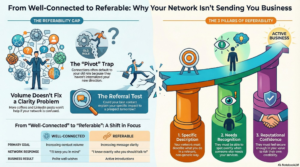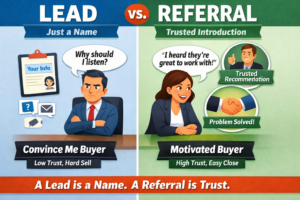Let’s address the elephant in the room: “sell” is technically a four-letter word. But it’s not one of the bad ones, despite what your instincts might tell you when someone suggests you need to “get better at selling.”
I’ve watched countless talented professionals recoil at the idea of selling. Developers, designers, consultants, even leaders—people with extraordinary skills who could genuinely help others—all shrinking away from what they perceive as something sleazy, pushy, or manipulative.
It’s time we get over our collective issues with selling. Because here’s the truth: this is one of the most vital functions in business today, and it’s nothing like the bad movie role starring Alec Baldwin that’s playing in your head.
What Selling Actually Is
Let me walk you through what selling really looks like when done right:
Selling starts with outreach to people who have problems they need to solve. Not cold-calling everyone in the phone book. Not spam-emailing strangers. It’s about identifying people who are struggling with something you can actually help with. That’s not manipulation—that’s service.
Next comes discovery of what the issues or challenges REALLY are. Here’s where it gets interesting: pain is usually a symptom of deeper underlying issues, not the issue itself. A company doesn’t need a new website because they want a prettier design; they need it because their current one isn’t converting visitors into customers. The real problem isn’t aesthetic—it’s revenue. Good selling means asking better questions and listening more than you talk.
Then there’s analysis of the real issue and root cause analysis of what’s causing it. You’re not just accepting the surface-level problem. You’re digging deeper. Why is conversion low? Is it the messaging? The user experience? The traffic quality? The offer itself? This is problem-solving, plain and simple.
After that, you move into collaboration to design an ideal solution to the issue. Notice the word “collaboration.” You’re not pushing a pre-packaged solution. You’re working together to figure out what will actually work for their specific situation. That’s partnership.
Then comes facilitating decisions to make changes and invest the necessary resources. Yes, this means asking for money or commitment. But if you’ve done everything above, you’re not convincing someone to buy something they don’t need. You’re helping them commit to solving a problem that’s costing them more than your solution will.
Finally, there’s accountability to the action required to achieve the desired objective. The sale doesn’t end when the contract is signed. Real selling means staying engaged, ensuring implementation, and holding everyone (including yourself) accountable to getting results.
So Tell Me: What Sounds Manipulative Here?
Read that process again. What in this sounds dishonest? What part involves trickery or coercion? What about this is anything other than a sincere desire to create impact?
If you answered “nothing,” you’re starting to get it.
The Heart of the Matter
At its core, sales is about influence and changing human behavior. And before you bristle at that, consider this: teaching is influence. Parenting is influence. Leadership is influence. Anytime you’ve convinced a friend to try a restaurant, recommended a book, or persuaded your team to try a new approach—that was sales.
The difference is that professional selling is simply more intentional about the process and yes, it involves an exchange of value (usually money). But the fundamental human skill is the same: understanding what someone needs, showing them a better path, and helping them take it.
Why This Matters Now More Than Ever
Here’s the critical part: selling cannot be done by technology alone. Can AI help with research? Absolutely. Can automation handle follow-ups? Sure. Can chatbots answer basic questions? Of course.
But can technology truly understand the unspoken fears behind someone’s questions? Can it read between the lines of what they’re saying to uncover what they really need? Can it build the trust required for someone to make a significant change in their business or life?
No. That requires something decidedly analog: human connection.
The ability to sell is a career game changer. I don’t care if you’re a software engineer, a consultant, a designer, or a CEO—if you can articulate value, build trust, and guide people to better decisions, you will always be in demand. You’ll command higher rates. You’ll have more opportunities. You’ll create more impact.
Today’s environment doesn’t reward people who hide behind their technical skills. It rewards those who can pair those skills with the ability to communicate their value, understand others’ needs, and facilitate change.
The Most Human Skill
The irony is that in our rush to automate everything, selling has become more valuable precisely because it’s so human. It requires empathy, creativity, adaptability, and genuine connection—all things that make us distinctly human.
This is your invitation to embrace all the things that make you human and lean into your gifts. Your ability to listen. To ask thoughtful questions. To see patterns others miss. To imagine solutions. To build trust. To inspire action.
These aren’t “sales skills”—they’re life skills. Sales just gives you a framework for deploying them intentionally.
Try Selling. I Bet You’ll Like It.
If you’ve been avoiding selling because you thought it required you to be someone you’re not, I challenge you to reconsider. The best salespeople aren’t the loudest or the pushiest. They’re often the best listeners. The most curious. The most genuinely helpful.
Start small. The next time someone asks what you do, don’t just give them a job title—tell them about a problem you solve. When a colleague mentions a challenge, ask deeper questions instead of immediately offering solutions. When you have an idea that could help your organization, make the case for it rather than hoping someone will notice.
You might just discover that you’re better at this than you thought. And more importantly, you might find that selling—real selling—feels less like manipulation and more like meaningful work.
Because when done right, that’s exactly what it is.






